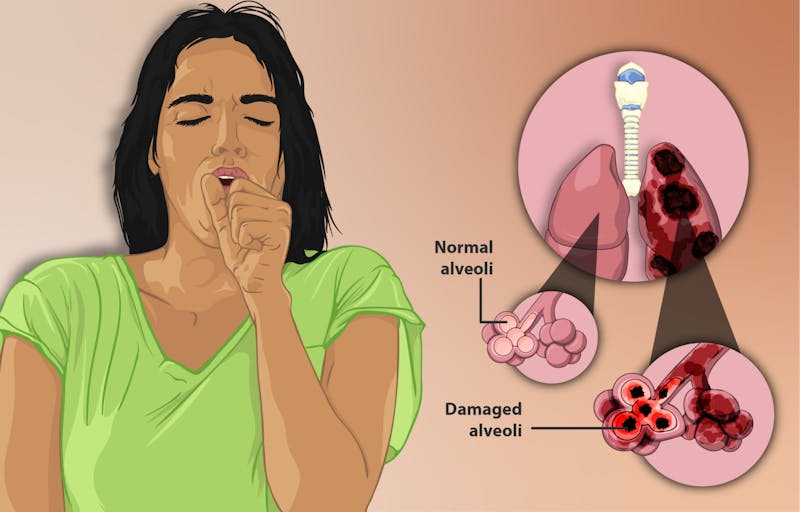Emphysema
Emphysema is one of the types of Chronic Obstructive Pulmonary Disease (COPD). In emphysema, the air sacs in the lungs become damaged and stretched, making it progressively difficult to breathe. Generally, emphysema coexists with chronic bronchitis. Together, these two conditions are known as Chronic Obstructive Pulmonary Disease.

Symptoms of emphysema
The symptoms usually progress slowly. You may not notice them until they start to interfere with your daily activities. The primary symptom of emphysema is shortness of breath. At first, you may notice breathing difficulty only when you are performing physical activities. However, in advance emphysema, breathing difficulty may occur with minimal activity or even when you are at rest. Other symptoms of emphysema include:
- Cough with phlegm
- Weight loss
- Fatigue
- Reduced appetite
- Chest tightness
- Swelling of the ankles
Diagnosis
Your doctor will begin by taking your medical history and physical examination. He may also ask you if you smoke or you have had contact with lung irritants like secondhand smoke, dust, pollution or fumes. He may recommend tests to determine whether you have emphysema. These tests include:
Lung function tests
Spirometry is the most common lung function test. It involves blowing into a device to measure how much air your lung can breathe in and out and how well your lung delivers oxygen to blood.
Arterial blood gas test
It measures the amount of oxygen and carbon dioxide in the blood.
Chest X-Ray
Your healthcare provider may use x-ray to look for damage in your heart and lungs.
Cause of emphysema
The major cause of emphysema is cigarette smoking. Inhaling second hand smoke, dust and fumes also increases your risk of getting emphysema. In some countries, indoor smoke from cooking and heating may also contribute to emphysema. Having a family history of emphysema also increases the risk if you smoke.
In some patients, emphysema develops from an inherited disease known as alpha 1-antitrypsin (AAT) deficiency. In this condition, body doesn’t produce enough Alpha-1 antitrypsin, an enzyme that protects the lungs from any damage.
Treatment of emphysema
There is no cure for emphysema. Treatment of emphysema aims to reduce symptoms and prevent complications. Smoking cessation is the most effective step in preventing further lung damage.
Bronchodilators
Bronchodilators are the main drugs used to relieve symptoms of emphysema. They help by opening the air passages in the lungs, making breathing easier and relieving coughing. Bronchodilators can be short-acting or long- acting. Short acting bronchodilators works quickly and are used when emphysema is mild. Long- acting bronchodilators are used every day and are prescribed in moderate or severe cases.
Steroids
Steroids reduces inflammation and shortness of breath. These are given as pills or as injections. However, long term use of steroids can cause side effects. Antibiotics- These are prescribed to fight infection that can make the condition worse such as pneumonia, acute bronchitis and flu.
Vaccination
Influenza and Pneumonia can cause serious problems in people with emphysema. So, vaccination against Influenza and pneumonia is highly recommended.
Pulmonary rehabilitation
It is a regular exercise program that may help you improve your symptoms. It may include breathing exercises, nutritional counseling, and psychological counseling.
Oxygen therapy
Oxygen therapy is recommended in severe cases. Some people may need oxygen all the time, while others may only need while performing physical activities.
Surgery
In some cases, people with severe emphysema may undergo surgery to reduce long volume. Lung reduction surgery is performed to remove small parts of the destroyed lungs. Lung transplantation is recommended if you have severe lung damage and all other options have failed.
DISCLAIMER
This web page provides general information and discussions about health, medicine and related subjects. The information and other content provided on this website, or in any linked materials, are not intended and should not be construed as medical advice, nor is the information a substitute for professional medical expertise or treatment.
The content is for information purpose only and is not a medical advice. Qualified doctors have gathered information from reputable sources; however Credence Medicure Corporation is not responsible for errors or omissions in reporting or explanations. No individual should use the information, resources and tools contained herein to self diagnose or self treat any medical condition.
If you or any other person has a medical concern, you should consult with your health care provider or seek other professional medical treatment. Never disregard professional medical advice or delay in seeking it because of something that have read on this blog or in any linked materials. If you think you may have a medical emergency, call your doctor or emergency services immediately.
The opinions and views expressed on this blog and website have no relation to those of any academic, hospital, health practice or other institution. Credence Medicure Corporation gives no assurance or warranty regarding the accuracy, timeliness or applicability of the content.
